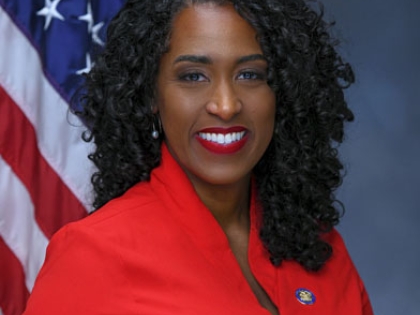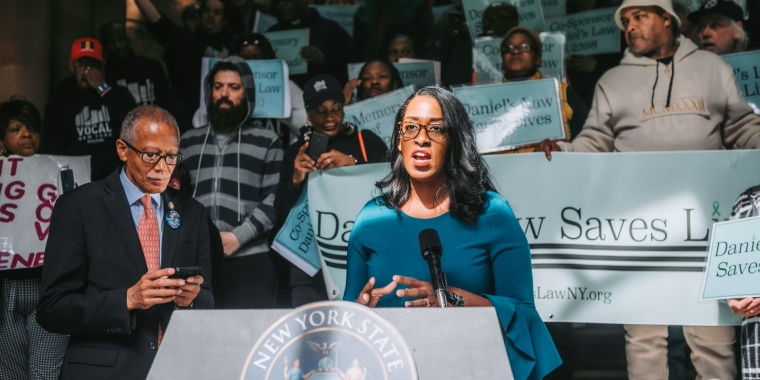
Rochester-Area Legislators Introduce Package of Bills to Address Violent Encounters with Law Enforcement and Resulting Trauma
February 24, 2021
-
ISSUE:
- Police reform
- Daniel's Law
###
FOR IMMEDIATE RELEASE
February 24, 2021
Media contacts:
Jenna McDavid, Communications Manager, Senator Brouk - mcdavid@nysenate.gov
Courtney Renford, Community Relations Director, Assemblymember Clark - renfordc@nyassembly.gov
Rochester, NY - Members of the New York State Senate and the New York State Assembly have introduced a package of legislation intended to alter police responses to people in crisis, including a ban on the use of spit hoods, the creation of statewide mental health response units, a ban on the use of chemical irritants on minors, and a requirement that police reside in the cities in which they work. The introduction of these bills is an important first step in responding to the harms that our communities are experiencing at the hands of law enforcement, in particular, Black and brown people and people experiencing a mental health or substance abuse crisis.
In the Attorney General’s press conference and subsequent report on the death of Daniel Prude, Attorney General Tish James called for reforms that are addressed in the legislation that the Rochester delegation has introduced, including:
- States and law enforcement agencies should re-analyze the use of “spit hoods,” a tool that was used in the arrest of Daniel Prude and may have contributed to his death
- Communities should assess models for responding to crisis situations that minimize or eliminate police responses to mental health calls whenever possible, as in the mental health response units that would be created under Daniel’s Law
- All police officers should be mandated to undergo de-escalation training and unconscious bias training, which may have prevented the experience of the nine-year-old girl who was pepper sprayed by police in Rochester in January 2021
“Right now, my community is hurting, and we have to put them first. This package of legislation is an important step in responding to both the acute injury and the lasting, generational trauma at the hands of law enforcement that we have experienced here in Rochester,” stated Senator Samra Brouk. “The recommendations made by Attorney General Letitia James during her announcement of the grand jury findings yesterday are echoed in the reform work that my fellow Rochester-area legislators and I have been doing, and they are an important step in rebuilding our community’s trust and beginning the process of healing from these traumatic experiences.”
“History has shown justice for Black and brown communities is rare, and Rochester is clearly no exception. What is evident is that we need to change our system, or lives will continue to be destroyed,” said Assemblymember Sarah Clark. “I, along with my colleagues in the Rochester delegation, am working on several critical reforms in the hopes that we can build community trust and ensure accountability from law enforcement, and begin the healing process. This legislation is a start, but there is much more work to be done in the days and months ahead.”
"Time and time again, our Black and brown communities are failed by a system that purports to protect them,” stated Assemblymember Jen Lunsford. “We must address the laws that deny justice to victims of police violence over and over and over again. This package goes a long way towards reconstructing the framework that props up this system. I am proud to support these bills and to ensure Daniel Prude did not die in vain.”
“The Grand Jury’s actions in the case of the Rochester Police Department’s neglect of Daniel Prude once again have brought to light unequal justice in our state,” said Assemblymember Harry Bronson. “We need justice and equality. I am pleased to join my colleagues in sponsoring and supporting policies that foster dramatic, transformative, and systemic changes in law enforcement training and mental health crisis in New York State. Our community will no longer tolerate policies that are void of justice.”
“Again, a Black man dead after an interaction with the police. Again, a system that finds the police officers not responsible for the actions that led to his death. I’m disgusted by this predictable result,” said Assemblymember Demond Meeks. “Verdicts like these endorse police brutality and unchecked racial and implicit bias housed within police departments. This tragic event, this dispiriting verdict, should reveal to us that the police are not qualified to respond to people experiencing a mental health crisis. While my heart is heavy, my work toward equity and justice for my community will not stop. I will fight for the passage of Daniel’s Law A4697, banning chemical irritants A5449, and the police residency requirement A4565. I will fight for the investment in preventive programs and initiatives that cause the hurt within our city. I stand with the Prude family, and I will continue to fight for the justice and transparency we all deserve.”
“Everyone can agree that policing can be dangerous work,” said State Senator Brian A. Benjamin, “but that doesn’t mean it has to be made more dangerous by using tools and techniques that inflict unnecessary harm on people being arrested. As we saw last spring with Daniel Prude, a spit hood introduces an unnecessary danger to the situation. I cannot see any possible world where someone should have a bag put over their head and be put in mortal danger just because the police are trying to calm them down. It’s obvious that this could go wrong, and in this case, it did. This is something we won’t have in New York.”
Bill S.4462 (Benjamin/Brouk) / A.4566 (Clark/Meeks), the most recent bill introduced into the Senate and Assembly from this package of reforms, would ban the use of “spit hoods” by law enforcement. These devices can cause disorientation and psychological and physical trauma, and in some cases have led to unintended injury and death. In the case of Daniel Prude’s death, it appears that the police used this sack in conjunction with other physical constraints that combined to asphyxiate Mr. Prude. This legislation balances the safety concerns of law enforcement with the safety of those who may need to be subdued.
In addition to this new legislation banning the use of spit hoods by law enforcement, members of the Rochester-area delegation of legislators, including Senator Samra Brouk (SD-55), Assemblymember Harry Bronson (AD-138), Assemblymember Sarah Clark (AD-136), Assemblymember Jen Lunsford (AD-135), and Assemblymember Demond Meeks (AD-137), have introduced a variety of other bills to address police violence and the resulting trauma:
- Bill S4002 (Brouk) / A5449 (Meeks) would ban the use of chemical irritants on minors. This bill was introduced in response to the pepper spraying, handcuffing, and restraint of a nine-year-old girl in Rochester last month. During her visit to Rochester this week, AG James plans to meet with the girl’s family to hear more about their experience and discuss possible solutions, including this one. This bill has just passed the Senate Codes Committee and is moving through the process to become law.
- Bill S4814 (Brouk) / A4697 (Bronson), known as “Daniel’s Law,” would create statewide mental health councils that would respond to people experiencing a mental health or substance abuse crisis. Daniel’s Law was specifically mentioned by AG James during her press conference in Rochester yesterday and in a separate meeting with local elected officials. This bill has been introduced in both the Senate and the Assembly and is a budget priority for the delegation. It is currently in committee.
- Bill S2960 (Brouk) / A4565 (Clark) would make it a requirement for all newly hired officers of the Rochester Police Department to live in the community in which they police. It is imperative that the people enforcing a community’s laws are members of that community. Trust in the Rochester Police Department has been shattered by these recent incidents, and this would be an important step in rebuilding that trust and fostering a sense of personal investment in the communities that our law enforcement officers serve.
The Rochester area delegation is committed to working with advocates, state leadership, and community members to pass these important pieces of legislation, but this is not the end of the essential work that must be done to heal the deep wounds, hurt, and anger in our communities.
###
related legislation
Share this Article or Press Release
Newsroom
Go to NewsroomDaniel’s Law Task Force hosts meeting in Albany
May 29, 2024


